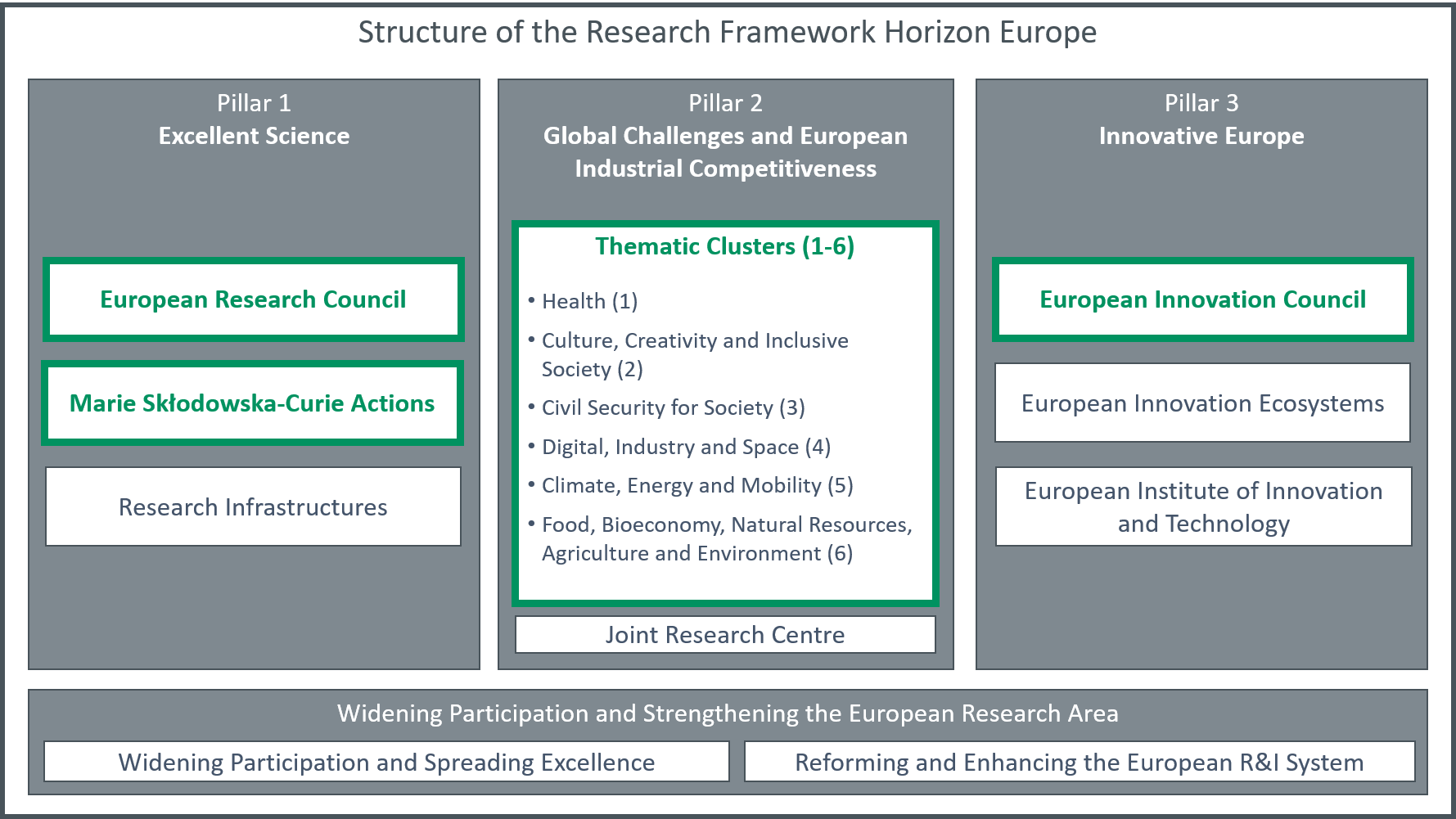Research Funding by the EU
Research funding by the EU takes place within the framework of the Horizon Europe research programme. This has a duration of 2021-2027 and is structured in the three pillars of Scientific Excellence, Global Challenges and Innovative Europe as well as the fourth block to strengthen the European Research Area (see Figure 1).

Figure 1: Structure of the Research Framework Horizon Europe
- European Research Council (ERC): Individual grants for excellent scientists and their teams with groundbreaking open-topic research projects.
- Marie Skłodowska-Curie Actions (MSCA): Individual grants and grants for collaborative networks, increasing the transnational and intersectoral mobility and career development of young researchers
- Thematic Clusters: Research cooperation in European collaborative projects on specific calls.
- European Innovation Council (EIC): Research and development of breakthrough innovations with market-changing impacts.
For more information on these programmes or on other EU funding opportunities outside Horizon Europe, and for advice from the Research Support Office, please see below or contact the Research Support Office directly.
The following Horizon Europe funding lines are of particular interest to UBT researchers:
- European Research Council (ERC)Hide
-
The ERC funds groundbreaking, excellent research projects in all disciplines. An application is possible in the following five funding lines:
- ERC Starting Grants for researchers 2 - 7 years after PhD, with up to 1.5 million Euros over a maximum of five years
- ERC Consolidator Grants for researchers 7 - 12 years after PhD, with up to 2 million Euros over a maximum of five years
- ERC Advanced Grants for experienced researchers with up to 2.5 million Euros over a maximum of five years
- ERC Synergy Grants for groups of 2 to 4 researchers and their teams with up to 10 million Euros over a maximum of six years
- ERC Proof of Concept for translating ERC project results into innovations
Additional information:
- Marie Skłodowska-Curie Actions (MSCA)Hide
-
Promoting the mobility of researchers is the main focus of MSCA.
Requirements: Research stays in a certain country is only possible if the funded person has not been resident in that country for more than twelve months in the last three years prior to proposal submission (Postdoctoral Fellowships) or recruitment (Doctoral Networks). Funding lines under the MSCA:
- MSCA Postdoctoral Fellowships (individual research stays; worldwide; up to eight years after PhD)
- MSCA Doctoral Networks (European networks for the structured training of young scientists)
- MSCA Staff Exchanges (international knowledge transfer through staff exchange)
Additional information:
- Thematic ClustersHide
-
Funding of research cooperations in European collaborative projects on specific topics with concrete objectives.
Requirements: At least three institutions from three different EU member states or associated countries.
The thematic calls are structured in six clusters:
- Cluster 1: Health: content-related support from the National Contact Point (NCP) Health
- Cluster 2: Culture, Creativity and Inclusive Society (Society): content-related advice by the National Contact Point (NCP) Society
- Cluster 3: Civil security for society: content-related support from the National Contact Point (NCP) DIT and the National Contact Point (NCP) Security Research
- Cluster 4: Digitalisation, Industry and Space: content-related support from the National Contact Point (NCP) DIT and the National Contact Point (NCP) Space Research
- Cluster 5: Climate, Energy and Mobility (KEM): content-related support from the National Contact Point (NCP) KEM
- Cluster 6: Food, bioeconomy, natural resources, agriculture and environment: substantive
Additional information:
- European Innovation Council (EIC)Hide
-
The further development of results from fundamental research towards possible exploitation is subject of the EIC. EIC aims at market-creating innovations that pave the way for radically new, groundbreaking products, services, processes and business models. Several funding lines are available for researchers at universities:
- EIC Pathfinder Open (open-topic; at least three partners from three different associated countries; approx. 3 million euros)
- EIC Pathfinder Challenges (topics advertised; individual or collaborative projects; approx. 4 million euros)
- EIC Transition (building on EIC Pathfinder or ERC PoC; individual or collaborative projects; approx. 2.5 million euros)
Weitere Informationen:
- Other EU funding programmesHide
-
- ERAMUS+: International cooperations and transfer projects. Information about specific funding lines and calls for proposals. Advising through the Research Support Office.
- COST (networking activities in Europe): content-related support from German coordination office
- EUREKA (application-oriented research projects): content-related support from German advisory office
- INTERREG (cross-border cooperation; application-oriented projects): Information on specific regional programmes
- The European Social Fund Plus (ESF+) and the Regional Development Fund (ERRF) supports numerous federal and state projects. Here, projects with application-oriented research activities for higher education institutions can be founded. The situation is similar with topic-specific ERA-Net initiatives.
- ERAMUS+: International cooperations and transfer projects. Information about specific funding lines and calls for proposals. Advising through the Research Support Office.
The Research Support Office will be happy to put you in touch with further advisory services:
- Network of National Contact Points (NCP)
- European Liaison Office of the German Research Organisations (KoWi)
- Bavarian Research Alliance (BayFOR)
To submit an application in the EU's Funding & Tender Portal, you need the UBT's Participant Identification Code (PIC), which is 999 84 99 08.
The staff of the UBT's Research Support Office are available to answer your questions at any time and will support you throughout the entire application process.
